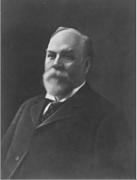|
|
||||||||||||||||||||||||
 |
Featured person
Recently added |
Amyan Macfadyen (1920 - 2015): |
||||||||||||||||||||||
Amyan Macfadyen was one of the most influential figures in ecology research and environmental education during the latter half of the 20th century. A soil ecologist, he carried out pioneering work on soil ecosystems using methods and approaches which did much to legitimise ecology as a major, though highly complex, scientific discipline.
Amyan Macfadyen was born on 11 December 1920. He was the eldest of three sons and two daughters of Sir Eric (1879-1966) and Violet Macfadyen (nee Champneys, 1895-1992). Sir Ericwas an English colonial administrator, rubber planter, businessman and developer of tropical agriculture. He was also Liberal Member of Parliament for Devizes in Wiltshire from 1923–1924.
Amyan grew up in Kent before attending Dauntseys School and then Balliol College, Oxford. His academic career was punctuated by war service in the Royal Electrical and Mechanical Engineers (REME), when he held the rank of captain with the Sherwood Foresters. Projects like welding spare tank tracks onto working tanks to increase protection taught him many practical and bodging skills, which re-emerged later in his design of novel experimental equipment.
He worked initially (1947-56) at the Bureau of Animal Population in Oxford under the direction of the eminent ecologist, Charles Elton. While there he met his future wife, Ursula (nee Hampton). They were married on 8 September 1951. He moved to Swansea in 1956 as lecturer in the zoology department , progressing to reader by the time he left in 1965. It was while at Swansea that he published “Animal Ecology - Aims and Methods”, the definitive textbook for a generation. In 1965 he moved to Denmark as Guest professor at the Jordbundsbiologisk Institute, Aarhus University, where he continued his research on soil ecology.
Macfadyen published on a wide range of ecological topics including the scientific and philosophical basis underpinning the subject. He discovered numerous new species of soil invertebrates. However, the major focus of his research work over 5 decades was on energy flows and metabolism in soil ecosystems, resulting in seminal publications which continue to be cited regularly. He was Editor of “Advances in Ecological Research” from 1965-92.
In 1967, Macfadyen was appointed one of two founding professors in biology (the other being Palmer Newbould) at the newly established New University of Ulster (NUU) in Coleraine, Northern Ireland. At that time degree programmes in the biosciences tended to be focussed on the more traditional subjects of botany and zoology. The biology honours programme at NUU developed by Macfadyen and Newbould was highly innovative, integrating emerging areas of the subject through a modular structure which students found exciting and challenging. Shortly thereafter they introduced groundbreaking programmes in ecology and also human ecology.
Although he eschewed administration and managerialism, Macfadyen bowed to peer pressure and accepted election as Dean and Pro Vice-Chancellor where his innate sense of fairness and academic vision won plaudits from across the university. In the latter role he championed and steered the introduction of biomedical sciences, led by his former student and subsequent Vice-Chancellor, Gerry McKenna, through the University Senate, and showed tenacity in withstanding external opposition to its development.
Macfadyen’s standing in ecology was reflected in his election as President of the British Ecological Society (1970-71) and as President of the International Association for Ecology (1970-75). He was elected a Member of the Royal Irish Academy in 1980.
Amyan retired from the then University of Ulster in 1986 which unfortunately coincided with the death of his beloved wife, Ursula. Together they had, during a period of almost 20 years, developed a magnificent 3 acre garden along the banks of the River Bann on the outskirts of Coleraine, which they generously opened freely to various causes and, indeed, to anyone with an interest in the huge range of species they had assembled there. Amyan adapted to being a widower, and developed a passion for cooking, along with active involvement in the Alliance party and Friends of the Earth. He further developed his Coleraine garden , and inspired others through sharing plants and offering advice. His research continued, including taking part in scientific expeditions to the Falklands and Tanzania as a soil invertebrate specialist.
In 2006, aged 86, he accepted reluctantly some of the limitations imposed by age and moved to Sheffield to be closer to his family. Characteristically he immediately developed another highly interesting, if more manageable, garden and threw himself into various local community and environmental causes, winning the individual South Yorkshire Care4Air award in his 90s. He embraced modern environmentally friendly technology, and was emailing friends and family about various environmental issues, or to sign petitions, until the fortnight before he died.
A person of great kindness and integrity, Amyan Macfadyen inspired and continued to have an enduring influence on a generation of biologists and ecologists, many of whom went on to achieve much scientific success and hold major positions of influence in higher education and research. He died on 3 October 2015 aged 94. He was survived by his daughter, Sophie and sons Timothy, Matthew and Peter, and 7 grandchildren. His remains are buried in South Yorkshire Woodland Burial Grounds.
| Born: | 11 December 1920 |
| Died: | 3 October 2015 |
| Gerry McKenna |


Home | Our Policies | Plaques | Browse | Search | Sponsors | Links | Help | Contact
Privacy & Disclaimer | Cookie Policy | Site Map | Website Design By K-Point
© 2024 Ulster History Circle









